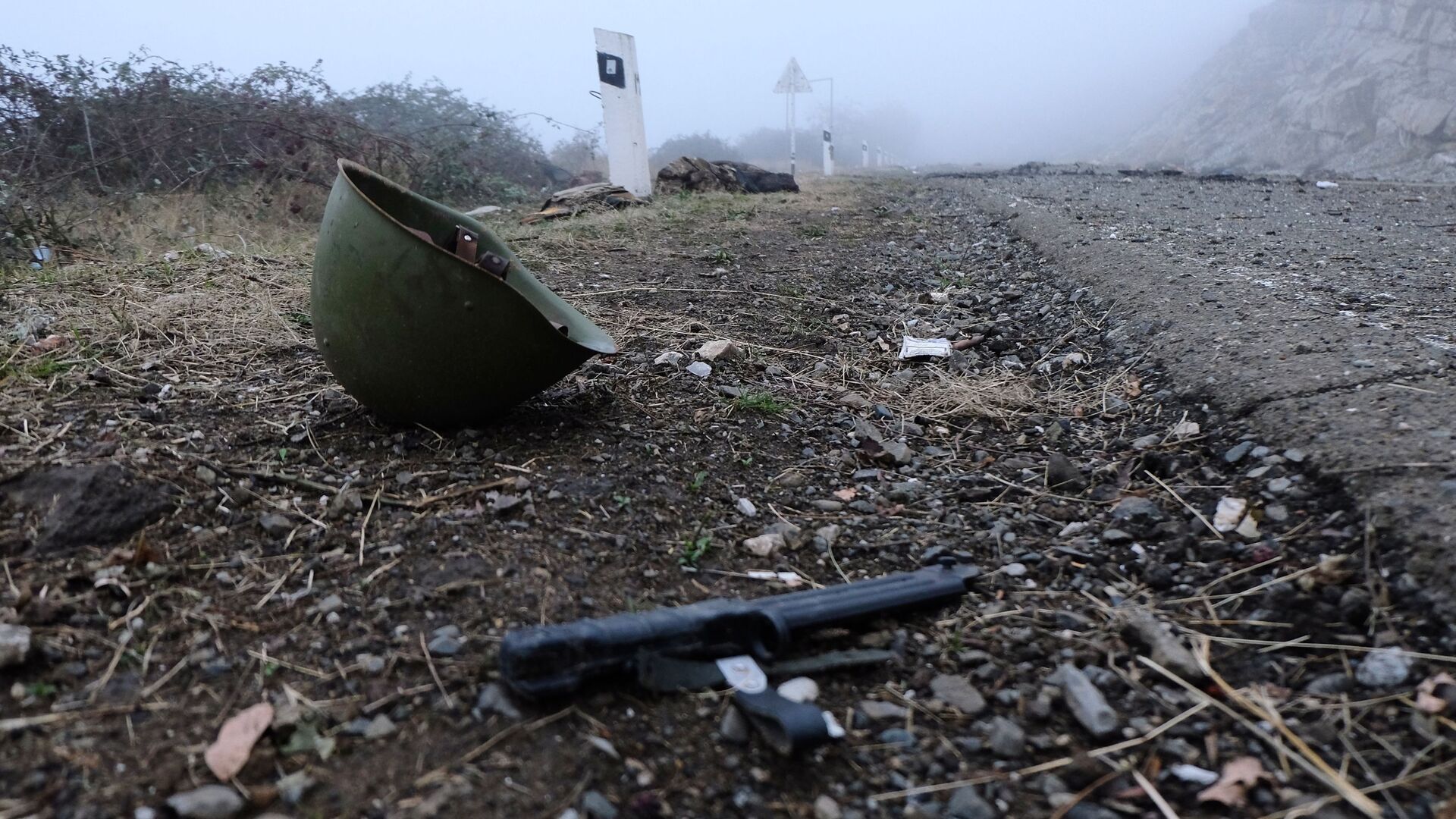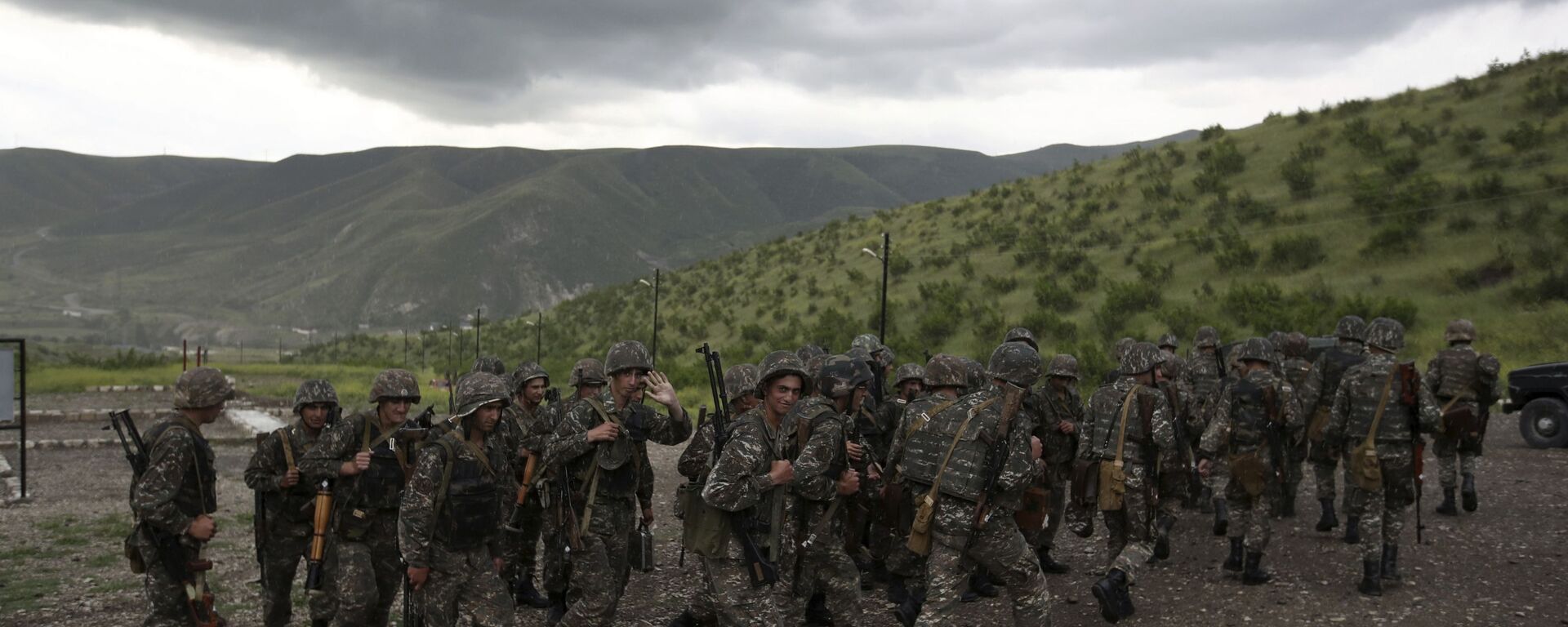https://sputnikglobe.com/20211116/osce-minsk-group-co-chairs-urge-armenia-azerbaijan-to-take-de-escalation-steps-1090761439.html
OSCE Minsk Group Co-Chairs Urge Armenia, Azerbaijan to Take De-escalation Steps
OSCE Minsk Group Co-Chairs Urge Armenia, Azerbaijan to Take De-escalation Steps
Sputnik International
YEREVAN (Sputnik) - The co-chairs of the OSCE Minsk Group on the Nagorno-Karabakh settlement, Igor Khovaev (Russia), Andrew Schofer (US) and Brice Roquefeuil... 16.11.2021, Sputnik International
2021-11-16T00:28+0000
2021-11-16T00:28+0000
2021-11-16T00:24+0000
osce minsk group
nagorno-karabakh conflict
https://cdn1.img.sputnikglobe.com/img/07e4/0b/10/1081178326_0:139:3151:1911_1920x0_80_0_0_a3d806f3a9490ef4bbf472084976aabd.jpg
Earlier, the Armenian Security Council reported that on November 14, on one of the eastern sections of the Armenian-Azerbaijani border, "Azerbaijani military units, supported by armored vehicles, invaded Armenian territory," and four combat posts of the Armenian Armed Forces were blocked. After talks, "the Azerbaijani military equipment and troops that invaded the sovereign territory of Armenia left the area; Armenian units were withdrawn from the above four combat posts."Nevertheless, according to Yerevan, the Azerbaijani military, who have been stationed there since May, remained in that area. In turn, Azerbaijani Foreign Ministry spokeswoman Leyla Abdullayeva denied Armenian reports about the alleged invasion of the Azerbaijani Armed Forces into the territory of Armenia."The recent increase in tension underscores the need for a negotiated, comprehensive, and sustainable settlement of all remaining issues related to or resulting from the Nagorno-Karabakh conflict," it said.The Co-Chairs urged the sides to build on the progress made during the joint meetings of the foreign ministers of Armenia and Azerbaijan held under the auspices of the Co-Chairs in New York and Paris.This should be done "by continuing to engage in direct dialogue aimed at contributing to security, stability, and prosperity in the region," the statement said.At the end of September 2020, hostilities resumed in Nagorno-Karabakh, which became a continuation of the long-term conflict and led to casualties among the civilian population. The sides made several attempts to sign a truce, but only the tripartite agreement reached overnight to November 10, 2020 turned out to be successful.With the mediation of Moscow, Azerbaijan and Armenia agreed to completely cease fire and exchange prisoners and bodies of the dead. Yerevan also transferred the Kalbajar, Lachin and partially Agdam districts to Baku. Russian peacekeepers were stationed in the region.The conflict in Nagorno-Karabakh began in February 1988, when the Nagorno-Karabakh Autonomous Region announced its secession from the Azerbaijani Soviet Socialist Republic. During armed confrontation in 1992-1994, Azerbaijan lost control of Nagorno-Karabakh and its adjacent areas. Since 1992, talks were ongoing on peaceful settlement of the conflict with the mediation of the OSCE Minsk Group, led by Russia, the United States and France.
https://sputnikglobe.com/20210412/canada-cancels-turkey-military-permits-over-nagorno-karabakh-conflict-foreign-minister-says-1082609650.html
Sputnik International
feedback@sputniknews.com
+74956456601
MIA „Rosiya Segodnya“
2021
Sputnik International
feedback@sputniknews.com
+74956456601
MIA „Rosiya Segodnya“
News
en_EN
Sputnik International
feedback@sputniknews.com
+74956456601
MIA „Rosiya Segodnya“
Sputnik International
feedback@sputniknews.com
+74956456601
MIA „Rosiya Segodnya“
osce minsk group, nagorno-karabakh conflict
osce minsk group, nagorno-karabakh conflict
OSCE Minsk Group Co-Chairs Urge Armenia, Azerbaijan to Take De-escalation Steps
YEREVAN (Sputnik) - The co-chairs of the OSCE Minsk Group on the Nagorno-Karabakh settlement, Igor Khovaev (Russia), Andrew Schofer (US) and Brice Roquefeuil (France) issued a statement in connection with the aggravation of the situation on the Armenian-Azerbaijani border, urging the sides to take de-escalation steps.
Earlier, the Armenian Security Council reported that on November 14, on one of the eastern sections of the Armenian-Azerbaijani border, "Azerbaijani military units, supported by armored vehicles, invaded Armenian territory," and four combat posts of the Armenian Armed Forces were blocked. After talks, "the Azerbaijani military equipment and troops that invaded the sovereign territory of Armenia left the area; Armenian units were withdrawn from the above four combat posts."
Nevertheless, according to Yerevan, the Azerbaijani military, who have been stationed there since May, remained in that area. In turn, Azerbaijani Foreign Ministry spokeswoman Leyla Abdullayeva denied Armenian reports about the alleged invasion of the Azerbaijani Armed Forces into the territory of Armenia.
"The Co-Chairs view with deep concern recent incidents in the region, including those along the Armenia-Azerbaijan border. The Co-Chairs call on the sides to take concrete steps to de-escalate the situation immediately. The Co-Chairs also urge the sides to refrain from inflammatory rhetoric and provocative actions, and implement in full the commitments they undertook under the November 9 statement and other jointly agreed ceasefire arrangements," the Minsk Group Co-Chairs' statement said.
"The recent increase in tension underscores the need for a negotiated, comprehensive, and sustainable settlement of all remaining issues related to or resulting from the Nagorno-Karabakh conflict," it said.
The Co-Chairs urged the sides to build on the progress made during the joint meetings of the foreign ministers of Armenia and Azerbaijan held under the auspices of the Co-Chairs in New York and Paris.
This should be done "by continuing to engage in direct dialogue aimed at contributing to security, stability, and prosperity in the region," the statement said.
At the end of September 2020, hostilities resumed in Nagorno-Karabakh, which became a continuation of the long-term conflict and led to casualties among the civilian population. The sides made several attempts to sign a truce, but only the tripartite agreement reached overnight to November 10, 2020 turned out to be successful.
With the mediation of Moscow, Azerbaijan and Armenia agreed to completely cease fire and exchange prisoners and bodies of the dead. Yerevan also transferred the Kalbajar, Lachin and partially Agdam districts to Baku. Russian peacekeepers were stationed in the region.
The conflict in Nagorno-Karabakh began in February 1988, when the Nagorno-Karabakh Autonomous Region announced its secession from the Azerbaijani Soviet Socialist Republic. During armed confrontation in 1992-1994, Azerbaijan lost control of Nagorno-Karabakh and its adjacent areas. Since 1992, talks were ongoing on peaceful settlement of the conflict with the mediation of the OSCE Minsk Group, led by Russia, the United States and France.




